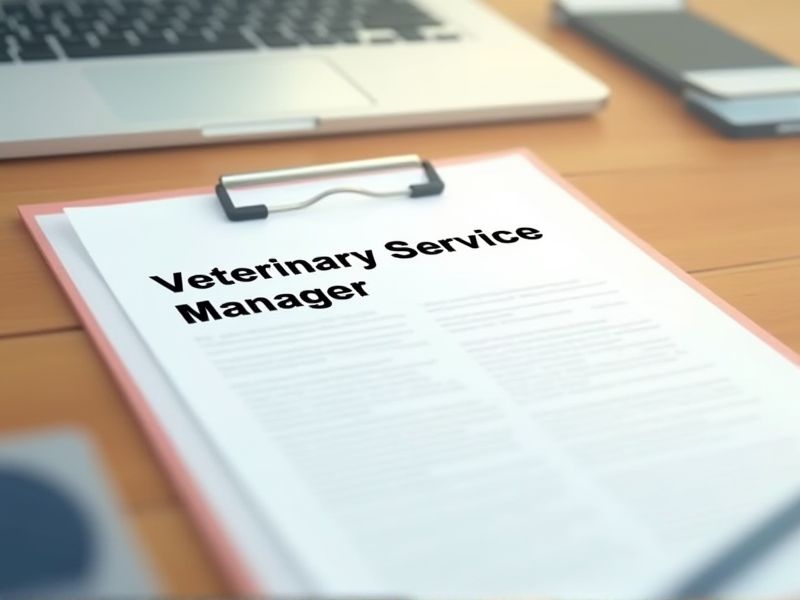
Veterinary Service Managers must possess specialized certifications to effectively oversee veterinary operations and ensure quality animal care. Certain certifications provide them with advanced knowledge in animal health management, business administration, and customer service. These qualifications enable them to uphold industry standards and enhance team productivity. Some important certifications you might need for a Veterinary Service Manager include the Certified Veterinary Practice Manager (CVPM) and others relevant to specific operational needs.
Licensed Veterinarian (DVM or equivalent)
A Licensed Veterinarian is needed for a Veterinary Service Manager role to ensure medical protocols are followed, leveraging expertise in diagnostics and treatments. They possess the knowledge to train and oversee staff on best practices and animal care standards. Their qualifications allow them to address complex health concerns and make informed decisions on animal welfare. A licensed professional is credible in both client interactions and in leadership within the veterinary service team.
Certified Veterinary Practice Manager (CVPM)
Certified Veterinary Practice Manager (CVPM) provides a standardized benchmark for assessing managerial skills specific to the veterinary sector. This certification enhances credibility, showing clients and staff that the practice embraces professional management standards. As veterinary service managers grapple with complex tasks, such as financial oversight and regulatory compliance, CVPM certification equips them with necessary tools and knowledge. Staff morale and client satisfaction often improve due to more efficient operations and well-managed services.
Certified Veterinary Hospital Manager (CVHM)
The presence of a Certified Veterinary Hospital Manager (CVHM) enhances the operational efficiency of a veterinary service by ensuring adherence to industry standards and regulations. This certification signifies a comprehensive understanding of financial management, human resources, and veterinary practice laws, crucial for maintaining a clinic's reputation and compliance. A CVHM brings expertise in staff development and client communication, which directly impacts client satisfaction and employee retention. The specialized skills of a CVHM in handling complex logistical and administrative challenges bolster the strategic growth and sustainability of veterinary services.
AAHA Accreditation
AAHA Accreditation ensures that veterinary practices adhere to high standards of care, which directly impacts a Veterinary Service Manager's ability to maintain quality control. This accreditation provides a structured framework that assists the manager in implementing continuous improvement strategies. Accredited practices attract more clients, thereby enhancing the business's financial health and resource allocation managed by the Veterinary Service Manager. Training protocols established through accreditation aid the manager in effectively onboarding and developing staff skills.
Certified Professional in Healthcare Management (CPHM)
The healthcare sector increasingly emphasizes efficiency and quality, leading veterinary service managers to pursue the Certified Professional in Healthcare Management (CPHM) designation for enhanced leadership skills. The CPHM certification provides critical insights into healthcare management practices, which veterinary managers can adapt to streamline operations and improve patient care in animal clinics. As veterinary practices face growing challenges such as regulatory compliance and patient data management, CPHM equips managers with the necessary expertise. This credential supports career advancement and is linked to better organizational outcomes in veterinary services.
Project Management Professional (PMP)
Project Management Professional (PMP) certification equips Veterinary Service Managers with structured methodologies that improve project planning and execution efficiency. This certification enhances a manager's ability to manage resources effectively, which is vital for maintaining high-quality care and facility operations. The knowledge gained through PMP helps streamline communication across teams, reducing misunderstandings and delays. It also instills best practices in risk management, crucial for handling unexpected challenges in veterinary services.
Lean Six Sigma Green Belt
Implementing Lean Six Sigma Green Belt in veterinary service management enhances efficiency by systematically identifying and reducing waste in processes. This approach improves service quality, leading to increased client satisfaction and better animal care outcomes. Applying these principles aids in streamlining operations, which results in cost reduction and higher profitability. The structured methodology empowers managers to lead change effectively, fostering a culture of continuous improvement in the practice.
Certified Manager (CM)
Veterinary practices often face complex operational challenges, and having a Certified Manager (CM) ensures these are effectively navigated. CMs possess a validated skill set in business and management principles, allowing veterinary service managers to optimize workflows and improve efficiency. The certification equips managers with strategies to enhance team performance and patient care. CMs also bring a level of professionalism and credibility that can positively influence client trust and business growth.
Certified Veterinary Business Consultant (CVBC)
A Certified Veterinary Business Consultant (CVBC) is needed for a Veterinary Service Manager to enhance operational efficiency, ensuring that clinics operate smoothly and profitably. Extensive industry knowledge provided by CVBCs aids in strategic planning and financial management, reducing the likelihood of financial pitfalls. They offer insights that assist in compliance with legal and ethical standards, crucial for maintaining a clinic's reputation. CVBCs play a pivotal role in improving client satisfaction by suggesting practices that refine service delivery and client interaction.
Certified Financial Manager (CFM)
In the veterinary service industry, financial management is crucial to ensure the sustainability of operations, which necessitates a Certified Financial Manager (CFM). CFMs provide expertise in budgeting and forecasting, which enables veterinary service managers to allocate resources efficiently. Accurate financial reporting facilitated by CFMs helps in compliance with regulatory standards, reducing the risk of legal issues. The analytical skills of a CFM aid in identifying cost-saving opportunities, directly impacting the profitability of veterinary services.
Summary
As a Veterinary Service Manager, obtaining certifications can enhance your expertise, increasing your credibility and trustworthiness within the veterinary community. This often leads to improved management skills and more efficient clinic operations, benefiting both staff and patient care. Certification can also broaden your career opportunities, potentially leading to promotions or roles in larger organizations. Your investment in professional development can result in better team morale and higher client satisfaction.
